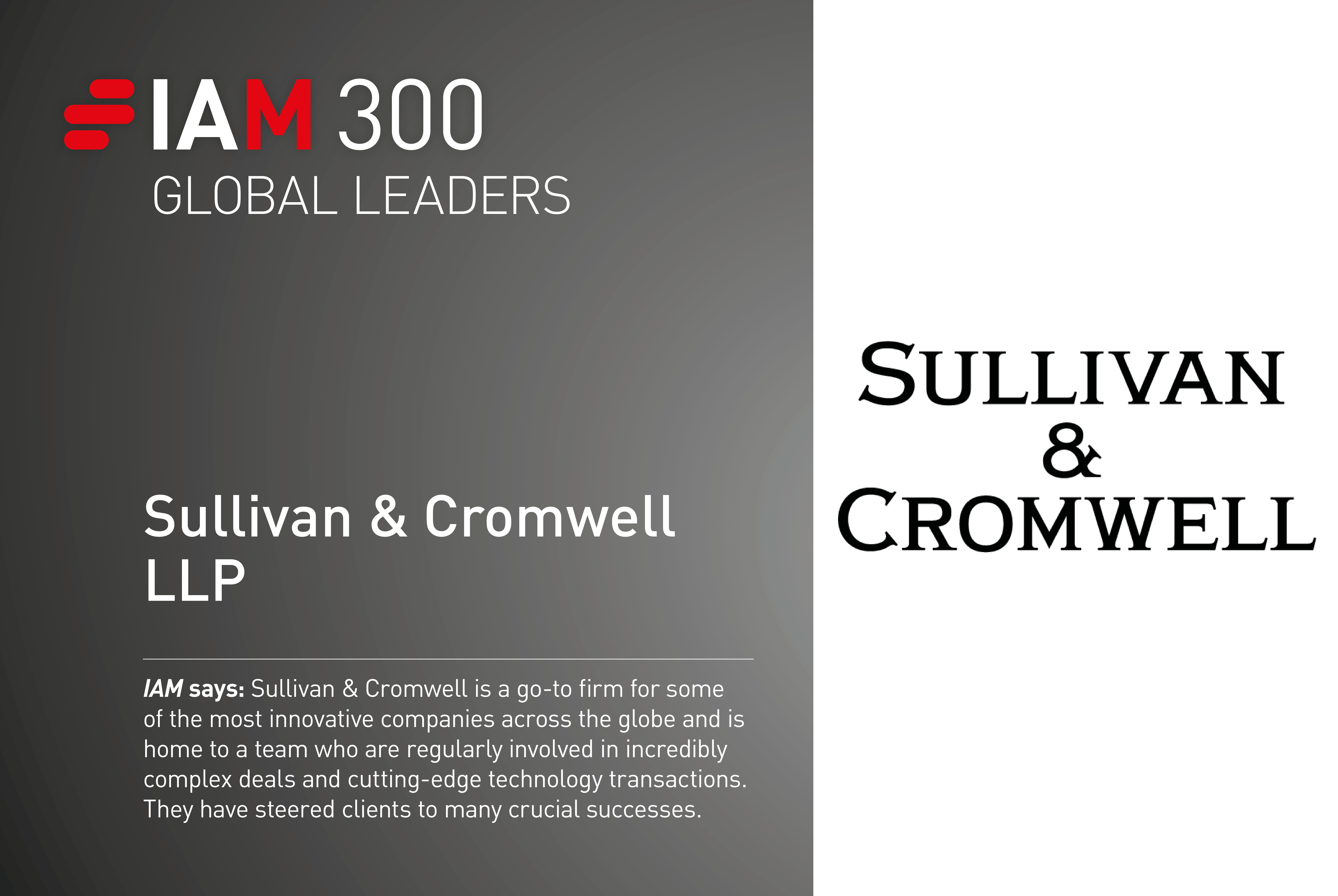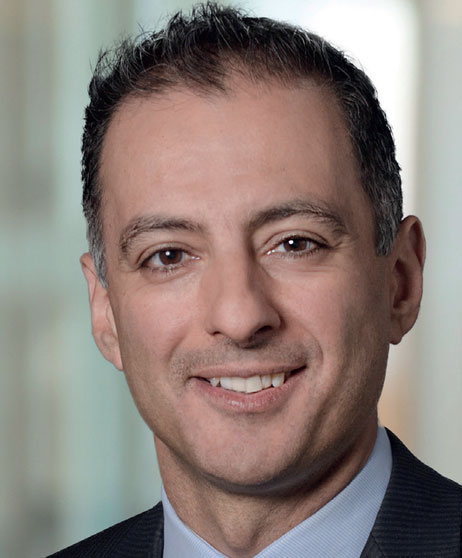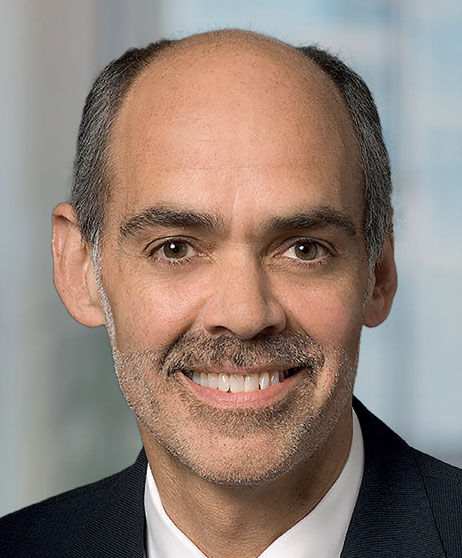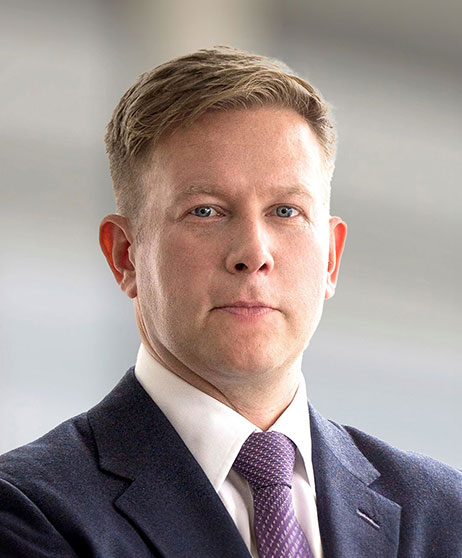Sullivan & Cromwell
Sullivan & Cromwell is renowned around the world for its industry-leading services. What is it that makes the firm so unique?
Garrard Beeney (GB): What makes Sullivan & Cromwell special is our 144-year tradition of excellence and devotion to a client’s cause, which we pass down from generation to generation. Our high standards and dedicated recruiting staff ensure that we maintain an exceptional quality of lawyering and service. Another aspect that makes the firm unique is that most partners have spent their careers here and our tradition of collaboration and dedication to clients is embedded in our culture.
Dustin Guzior (DG): We pride ourselves on being generalists. When you come to us with an IP dispute, we bring more-than-extensive knowledge of IP law to the case. We also offer the perspective of lawyers who have tried and litigated cases across multiple practice areas and venues, which allows us to think creatively. In the past two years alone, we have worked on federal and state jury trials, arbitrations and administrative proceedings before patent offices and the International Trade Commission, as well as proceedings in several foreign courts. I think that our ability to practise seamlessly across domestic and foreign venues and subject matters distinguishes us from other firms.
Also, we are excited that Andrei Iancu and Kathleen O’Malley have recently joined the practice. Andrei Iancu is a former director of the USPTO, and Kathleen O’Malley was a federal judge for more than 27 years, including most recently serving on the US Court of Appeals for the Federal Circuit. The addition of Mr Iancu and Ms O’Malley will enhance our ability to serve our clients in IP and tech matters.
How does the firm ensure that key personnel stay up to date on the latest developments in multiple fields?
Nader Mousavi (NM): The practice of intellectual property – whether it be litigation or transactions – is informed by a deep understanding of underlying substantive law, both within and outside the United States, because many of our matters are cross-border and have international implications. We closely track developments relevant to our practice, and we consult and exchange information extensively. We are driven by a culture of intellectual curiosity, as well as a commitment to ensure that our judgement and advice to clients are informed by relevant developments. We encourage a culture of collaboration, debate and open discussion to ensure that different views are aired. By the time we end up forming a view on a difficult issue, we have vetted considerations from all angles.
As a recent example, we are currently at the forefront of developments in AI and have committed multidisciplinary teams tracking legal, market and policy developments as they occur, so that we can continue to advise our clients at the forefront of AI in their most crucial deals and decisions.
What are some of the biggest challenges that Sullivan & Cromwell has faced in the past 12 months, and how has the firm stepped up to meet them?
GB: One of the main challenges is the rapid pace of technological development and adapting legal services to those changes. We need to ensure that we incorporate valuable changes efficiently while delivering the best services to our clients.
Sullivan & Cromwell is committed to fostering a diverse, equitable and inclusive work environment. How much has this been driven by client demands and how much by the firm striking out by itself?
NM: Sullivan & Cromwell is a firm where diversity is not just welcomed but celebrated, and that includes diversity of all kinds. Different viewpoints and perspectives are valued and people’s life experiences are a part of that. We are very focused on recruiting, training, supporting and elevating diverse lawyers.
DG: We think about having diverse case and trial teams independent of client demands. It is something that is important to us culturally, and it is important to me personally as a member of the firm’s diversity committee and the partner-sponsor of the LGBTQ+ network.
How does senior leadership manage the firm to ensure that clients receive the highest standard of service while all staff fulfil their potential?
NM: We see these two objectives as complementary. We are committed to the highest standard of service for our clients and we believe that an inclusive culture that values teamwork and contribution from lawyers of all levels is the best way to achieve that goal. We have a culture of mentorship and we value training highly. We have long represented clients in their most complex and significant IP matters – this work, combined with our lean staffing, provides opportunities for associates to have significant responsibility early on in their careers. We also provide extensive training, oversight and feedback, both formally and informally.
Sullivan & Cromwell works with a wide range of clients, from commercial companies to governments to estates to educational and cultural institutions. How does the firm adapt its approach depending on the type of client it’s dealing with?
DG: We do not categorise clients; we personalise our approach for each one. The best part of the job is getting to know our clients – their personalities and the way their businesses and legal teams work. We pride ourselves on understanding our clients as people and creating a working partnership. Some of our biggest successes in the IP and technology group have been a direct result of how well we get to know and work day to day with individual clients. We make their problems and concerns our problems and concerns, and then work together toward the best solution.
How is the firm planning to recruit, mentor and retain the next generation of talent?
GB: Our goal is to maintain our standing as a firm that clients turn to with the most exciting, challenging and rewarding matters in the industry, and this is something we always keep in mind when recruiting. We look for lawyers who take pride in practising law at the highest level and want to improve their craft. We retain talent by ensuring that every senior lawyer mentors junior lawyers and gives them every opportunity to become the best lawyer that they can be.
There is increasing talk about how arbitration might be used to settled SEP/FRAND disputes – what are some of the pros and cons of using alternative dispute resolution in this space?
GB: This is generally a solution in search of a problem. The market works far more often than it does not. There are hundreds of thousands of consensual licences of intellectual property that fly under the radar every year. In order to correct and address a minuscule proportion of transactions that ultimately result in disputes, the proposals to create an enormously expensive and uncertain infrastructure really do overstate the problem. Having said that, to the extent that individual parties are willing and believe that alternative dispute resolution is a path that they should take, we certainly encourage that in our practice. However, imposing the cost of a heavy-handed government-run regulatory programme is entirely unnecessary.
Sullivan & Cromwell has been going for more than 140 years. What have been some of the firm’s proudest achievements?
GB: We are proud of our participation in the local community during times of need, such as during the aftermaths of 9/11 and Hurricane Sandy, when the firm recognised that it has a responsibility to facilitate the development of law in ways that improve lives. Additionally, over the years Sullivan & Cromwell has helped clients and non-profit organisations in need, changing lives and making legal history. To mention a few, we are helping asylum seekers, advocating for covid-19 protections for prisoners and the homeless, fighting for transgender acceptance and seeking reduced prison sentences for women who fought back against their abusers. We also regularly partner with our corporate clients and legal services providers during one-on-one legal clinics focused on specific legal issues.
Is Sullivan & Cromwell taking steps to future-proof itself, and what does this strategy look like?
NM: From my perspective, we prepare for the future by continuing to handle the most complex, critical and strategic work for our clients and delivering differentiated results that keep us at the forefront of our practices in the market. Another key way that we maintain this position is by recruiting and training the top legal talent, with each generation dedicated to passing on a stronger firm to the next.
Finally, we have been paying close attention to developments in legal technology, including AI. The firm has invested in AI projects, including in LAER AI, which is a venture by Cornell and Carnegie Mellon post-doctoral researchers. We are also continuing to develop a leading AI practice that is on the cutting-edge of legal and policy developments for the adoption and commercialisation of AI, including generative AI.
Nader A Mousavi
Partner
[email protected]
Nader Mousavi is co-head of Sullivan & Cromwell’s IP and technology transactions group. His practice focuses on technology-intensive M&A, divestitures, joint ventures and collaborations. Mr Mousavi’s work has been recognised by leading industry publications such as The American Lawyer, Chambers USA, Daily Journal, Law360 and the National Law Journal. He received a BA from the University of California and a JD from Stanford Law School.
Garrard R Beeney
Partner
[email protected]
Garrard R Beeney is co-head of Sullivan & Cromwell’s IP and technology group. He is recognised as a leading lawyer for his counsel to clients on IP and licensing transactions and litigation matters. Mr Beeney is a fellow of the American College of Trial Lawyers, the leading trial lawyers’ organisation in the United States. He obtained a BA from Swarthmore College and a JD from the University of Pennsylvania Law School.
Dustin F Guzior
Partner
[email protected]
Dustin Guzior is co-head of Sullivan & Cromwell’s IP and technology litigation group. He regularly represents clients in nine and 10-figure disputes across all technology fields and all types of cases. He also practises in all venues, representing clients in state and federal jury trials, administrative proceedings and domestic and international arbitrations. Mr Guzior has a BA from the University of Chicago and a JD from the Boston University School of Law.



